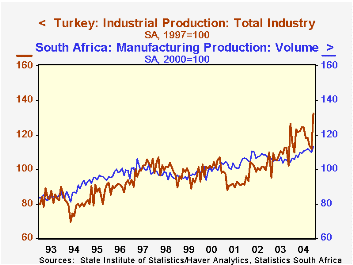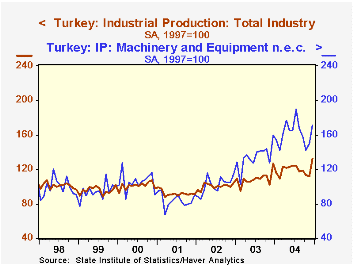 Global| Feb 09 2005
Global| Feb 09 2005December Production Up in UK, Down in Slovakia; South Africa, Turkey Work Toward More Stable Growth
Summary
Industrial production for December was reported over the last 24 hours in several countries, which encompass a variety of industrial environments. Growth in production was dominant, but it appears irregular or hesitant in the varying [...]

Industrial production for December was reported over the last 24 hours in several countries, which encompass a variety of industrial environments. Growth in production was dominant, but it appears irregular or hesitant in the varying regions.
Production in the UK was up 0.5% in December, about the same as November's 0.4%; at the same time, it was down 0.6% from a year earlier and up only a slim 0.4% for 2004 as a whole. December's performance looks promising, however, in that a large number of differing industries saw their output expand: furniture, chemicals, machinery and the entire oil/gas complex. Only three sectors experienced declines: paper products, basic and fabricated metals and utilities. UK production has had a lackluster trend since the 2001-02 recession, but perhaps the last couple of months mark a turn toward a firmer trend.
In Slovakia, output was down overall in December by 0.6%, but that followed a strong November gain of 3.9%. That country's industry has seen persistent expansion since 2000, albeit at a diminishing pace. In December, despite the overall decline, more industries had gains than had declines, so growth may well pick up again.
Manufacturing production in South Africa grew 3.1% in December, but with a rough balance in the number of sectors having rises and declines. The total advance was concentrated in consumer goods: furniture, textiles, food and wood and paper products, and energy products had the largest increase. Metals and equipment output declined. Year-on-year, manufacturing production was up a substantial 7.8%. This was the largest 12-month gain in South Africa since September 2002, but perhaps more significant is that month-to-month patterns have become less erratic since then. More stable short-run behavior can contribute to productivity and profitability, making growth more sustainable.
Production in Turkey, by contrast, remains widely swinging from month to month, and if anything, the swings have become greater in recent years. Even so, total growth has been strong: nearly 10% for 2004 as a whole. In December, output rose a large 18.6%; chemicals, metal products and non-metal products (glass and ceramics, for instance) led the surge. The thinness of Turkish industry is suggested by the fact that while those industries rose in December, the strength over the last few years has come from machinery production.
| % Changes, Months seasonally adjusted |
Dec 2004 | Nov 2004 | Oct 2004 | Year/ Year | 2004 | 2003 | 2002 |
|---|---|---|---|---|---|---|---|
| UK | +0.5 | +0.4 | -0.1 | -0.6 | +0.4 | -0.1 | -2.5 |
| Slovakia | -0.6 | +3.9 | -4.6 | +0.2 | +3.1 | +5.4 | +6.7 |
| South Africa | +3.1 | -1.3 | -0.7 | +7.8 | +4.0 | -2.0 | +4.5 |
| Turkey | +18.3 | -1.8 | -3.8 | +4.7 | +9.8 | +8.5 | +9.2 |
Carol Stone, CBE
AuthorMore in Author Profile »Carol Stone, CBE came to Haver Analytics in 2003 following more than 35 years as a financial market economist at major Wall Street financial institutions, most especially Merrill Lynch and Nomura Securities. She had broad experience in analysis and forecasting of flow-of-funds accounts, the federal budget and Federal Reserve operations. At Nomura Securities, among other duties, she developed various indicator forecasting tools and edited a daily global publication produced in London and New York for readers in Tokyo. At Haver Analytics, Carol was a member of the Research Department, aiding database managers with research and documentation efforts, as well as posting commentary on select economic reports. In addition, she conducted Ways-of-the-World, a blog on economic issues for an Episcopal-Church-affiliated website, The Geranium Farm. During her career, Carol served as an officer of the Money Marketeers and the Downtown Economists Club. She had a PhD from NYU's Stern School of Business. She lived in Brooklyn, New York, and had a weekend home on Long Island.
More Economy in Brief
 Global| Feb 05 2026
Global| Feb 05 2026Charts of the Week: Balanced Policy, Resilient Data and AI Narratives
by:Andrew Cates





